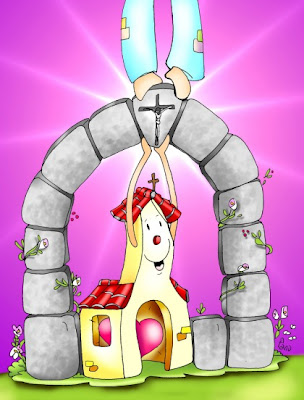WORLD’S MISSIONS SUNDAY
“You shall love your neighbor as yourself”
(Mt.22, 34-40)
Rev. Alexander Diaz
Today the church celebrates World’s Missions Sunday. I would like to invite everyone to go in depth about the meaning of this calling that has been given to us. This date is a call for all of us to be mindful of the duty that was given to us in baptism, thru our parents and godparents, which we confirmed in the sacrament of confirmation, to be witnesses and announcers of the good news of Jesus, by manifesting an active solidarity with those men and women who announce and proclaim the message of salvation to everyone who does not know God or probably knew Him but have forgotten about Him.
In this great day of World’s Missions, we have to be extremely conscious of our responsibility as witnesses of the Gospel, of our surroundings, familiar, laboral and as citizens. Let us express our solidarity with the missionary missions around the world, giving a generous donation that will go in full to the missionaries, both men and women, who proclaim the Word of Jesus in difficult circumstances.
This Sunday’s readings talk to us about love..love in two dimensions: To love God and love our neighbor. On these two commands the will of God is entailed in the Sacred Scriptures. Our relationship with God is vertical and our relationship with our neighbor is horizontal, as if forming a cross, in which both axles are indispensable. They have to be together, one cannot be separated from the other.
Our love for God is not based on admiration, is in recognition of His majesty…the love for God is an answer: I love God because I feel loved by Him. That is the root of the “commandment”, also the essence of the Good News. Deep down, the Good News is no more than this: God loves you, as your mother loves you, but His love is infinite.
This is an interior experience, not an intellectual knowledge. Conversion is not a repentance, a change of ideas, a calculated decision. Conversion is the consequence of a very deep rooted feeling, to feel loved by God changes life, changes hearts. This change is conversion.
Feeling loved by God not because we deserve it, but because we need it. God does not love me because I am good, just, a saint, God loves me, no more, as a mother loves her child, not because he is smart or good looking. She loves him even before he is born, without knowing him. That is how God loves me.
Not even my many sins can change the love of God. My mother’s love is so much stronger than my sins. God is Love, that is His essence. It is the heart of the Good News of Jesus. Our Faith is based on believing Him.
God-love is the essence of the world. The contrary of love is total death. To love or die, love or destruction. The essence of the human being is the capacity to build himself by loving.
The error is to try and build human society over other foundations: violence, power, justice. Justice is just a legal substitute or a consequence of love. Justice alone is not human either. No one can live of justice alone, because in the essence of the human being sin and error are needed, are mixed. Justice does not heal, does not change the insides of the human being. True justice is to give every one what belongs to him.
Pope Benedict, in respect to this affirms: “The characteristic of the Christian civilization is Charity, the love of God that translates into love of neighbor. Our love for God and our love for neighbor are inseparable.” (Benedict XVI, 19-10-2008).
The Lord tells us to: “love our neighbor as ourselves”, and ¿what is to love oneself? To love one-self is to look for our own good and our own pleasure. That is the minimal measure the Lord ask of us to love our neighbor. The point is that there is no difference between the love I have for myself and the love I have for others.
This is a given among brothers, in the family. Among brothers and in the family we use the first person of the plural rather than the first person of the singular. This characterizes a marriage that really love each other, very seldom they say “I” but instead they say “we”. This is what makes the difference in a Christian. To know who is God, to know who is the man, and to live for the good of others.
To know and feel that this is the best way to live for his own good. It is the selfishness being corrected, to look for my own good and to discover it when I serve, to forget to look for my own good. In other words, to realize oneself in love, not in hate, not in my triumph over others.
And let us remember that all the parables in the Gospel go on this direction. The Prodigal Son, the Good Samaritan, that is to enter the Kingdom. This is why, the unify proclamation of our faith is: “We have discover (Jesus has discover for us) the secret for everything, the secret of God and the secret of the world: love is what moves everything for the good of all.”
To accept that God, that man, that living style, that is the Kingdom. To love thy neighbor as thyself means to follow Jesus’ other advice: “Do to others as you would have them do to you” (Lc. 6,31).
We love ourselves so much, this is the minimal measure the Lord set for our love for others, He also gave us a maximum measure, one He showed with His example: ”Love one another as I love you” (Jn. 15,12). He loved us more than He loved Himself, giving up His life for all of us.
AMEN!



